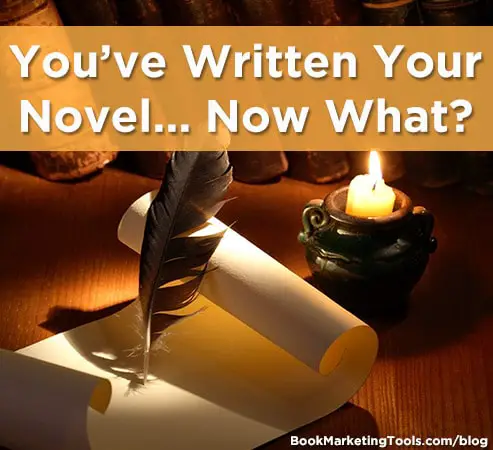Author Tracey Dawson previously explored starting to write a novel here, as well as keeping the writing momentum going. This finishes the discussion.
So after months or even years of hard work, you’ve finally written those beautiful words ‘The End’ and laid down your pen or saved and closed your document. What now? What can you do to take your creation on the next step in its journey? After all, you’ll have free time to do something with it now that you’re no longer writing!
Take a break
After doing all that writing, you deserve a rest! Resist the temptation to pick over your novel and start fiddling with it, and leave it alone for a good few weeks. Catch up with your reading, reacquaint yourself with your family, get outside and enjoy some fresh air. A complete change of regime will mean that you’ll return to the novel feeling enthusiastic, not jaded, and with a more detached perspective.
Enlist some help…
While you’re having your break, there is no harm in putting some wheels into motion, by sending your full draft to interested friends and family for proof reading. They can be getting on with it while you’re having your break – and remember NOT to start looking at your feedback until you’ve had several weeks away from the whole thing!
This is where being a member of a writers’ group can come in handy. If you’re a member of a group such as Gamlingay & District Writers’ Group you have a ready-made band of people who are very well placed to help you out – in exchange for your doing the same for them, of course.
…but make sure it’s the right sort of help…!
When you send your novel to your willing helpers, be specific about the sort of feedback that you’d like. If you are essentially happy with your novel and only want assistance with spotting typos or continuity errors (has your character started the chapter wearing a red dress, which has somehow morphed into a blue suit by the middle…?) then make sure you say so. If you have broader concerns, such as whether certain areas have worked, then spell this out. If you want an honest critique on the whole thing – plot, characters, action, writing style – include this in your covering email.
The wrong type of feedback can be worse than none at all – if you only wanted a proofread, it can be very disheartening to have your novel’s core premise pulled apart and thrown into doubt. Equally, it can be frustrating if you wanted a holistic and no holds barred appraisal of your work, and only receive notification of a few typos.
Once you’ve finished your writing holiday, you will feel ready to review your work with renewed eagerness. Collate all your feedback and use it to improve your novel, and then have a full read through to give it a final polish.
The journey into print?
Perhaps you’re perfectly happy just to have completed a full length manuscript which you can share with family and friends, or perhaps you have the hankering to go a little bit further and see your name on the spine of your very own book?
There is a very simple way to achieve this, which is also completely free. Amazon has a ‘Createspace’ facility on its website, which allows authors to make their work into a proper book. The program guides you through creating a cover, setting a pricing structure and uploading your work, and 24 hours later…you too have a book which is available in paperback and on kindle! Unlike vanity publishing, there is no need to pay for a print run; if anyone orders a copy of your book, it is printed and sent to them. The upside of this method is that it’s quick, easy…and you can have a copy of your book in your hands in a matter of days. The downside is, of course, that it’s solely up to you to generate interest and sales.
Then there’s the traditional route into print, which is via an agent. There are some useful tools for finding agents such as Agent Hunter, or you can just search online for agents which specialize in your genre. Find out whether they are accepting submissions from new authors, and if they are, check how submissions should be made – online, by post – and what their requirements are. While these vary from agent to agent, core components are often a covering letter explaining a little about you and your writing history, a synopsis of the whole novel (including what happens in the end!) and the first three chapters.
It’s worth spending some time on getting these exactly right as the agent will be using them to make a decision on whether to enquire any further about your work, so why not send these to your band of helpers for critique?
And once to process of contacting agents is well underway…you might feel revved up and ready to start on your next novel!
Tracey Dawson is a long-term writers’ group member and chair, and also a committed compliance professional. She has combined her two passions in her fifth novel, which follows the offworld adventures of Greville the compliance auditor, which is available on Amazon here.

